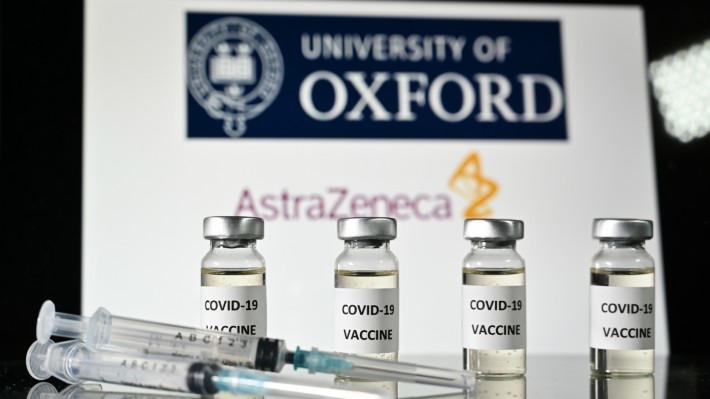Can ‘mixing and matching’ Covid vaccines boost protection?
UK launches study into pairing Oxford and Pfizer jabs to improve efficacy

A free daily email with the biggest news stories of the day – and the best features from TheWeek.com
You are now subscribed
Your newsletter sign-up was successful
A trial examining whether a combination of two different Covid vaccines could provide more effective protection against the virus is calling for volunteers.
The researchers behind the project - dubbed Com-Cov - are looking for people aged 50 and over to take part in the government-backed study.
The trial will compare the impact of giving a dose of the AstraZeneca-Oxford jab followed later by the Pfizer-BioNTech version - and vice versa. Run by the National Immunisation Schedule Evaluation Consortium, it will be based in eight hospitals in England.
The Week
Escape your echo chamber. Get the facts behind the news, plus analysis from multiple perspectives.

Sign up for The Week's Free Newsletters
From our morning news briefing to a weekly Good News Newsletter, get the best of The Week delivered directly to your inbox.
From our morning news briefing to a weekly Good News Newsletter, get the best of The Week delivered directly to your inbox.
Professor Matthew Snape, an Oxford University vaccine expert who is leading the trial, told Sky News: “We are looking to unroll the trial this month and then would start to get results through, probably in June or July, looking at the antibody levels at least.”
“Viral-based vaccines such as the Oxford jab, which is based on a chimp common cold virus, give a much greater cellular response - prompting the T-cells to kill cells infected with the coronavirus,” The Guardian says.
“The mRNA vaccines, like Pfizer’s, tend to generate a bigger antibody response”, the paper adds, leading to the hypothesis that giving patients one shot of each will generate a more powerful and long-lasting immune response to Covid-19.
Kate Bingham, chair of the government’s vaccine task force, has given her backing to the study, explaining that “antibodies block the uptake of viruses into cells and the cellular T-cells identify those cells that have been infected and take them out. You ideally want to have both”.
A free daily email with the biggest news stories of the day – and the best features from TheWeek.com
The process of mixing vaccines is known as heterologous boosting and has previously been used in “some Ebola immunisation programmes... to improve protection”, the BBC reports.
Vaccines minister Nadhim Zahawi said the government’s taskforce had given about £7m to fund the study, adding that similar studies have been done with other vaccines such as jabs for hepatitis, polio and measles, mumps and rubella.
The results of the study are expected to become available in the summer.
Joe Evans is the world news editor at TheWeek.co.uk. He joined the team in 2019 and held roles including deputy news editor and acting news editor before moving into his current position in early 2021. He is a regular panellist on The Week Unwrapped podcast, discussing politics and foreign affairs.
Before joining The Week, he worked as a freelance journalist covering the UK and Ireland for German newspapers and magazines. A series of features on Brexit and the Irish border got him nominated for the Hostwriter Prize in 2019. Prior to settling down in London, he lived and worked in Cambodia, where he ran communications for a non-governmental organisation and worked as a journalist covering Southeast Asia. He has a master’s degree in journalism from City, University of London, and before that studied English Literature at the University of Manchester.
-
 Bad Bunny’s Super Bowl: A win for unity
Bad Bunny’s Super Bowl: A win for unityFeature The global superstar's halftime show was a celebration for everyone to enjoy
-
 Book reviews: ‘Bonfire of the Murdochs’ and ‘The Typewriter and the Guillotine’
Book reviews: ‘Bonfire of the Murdochs’ and ‘The Typewriter and the Guillotine’Feature New insights into the Murdoch family’s turmoil and a renowned journalist’s time in pre-World War II Paris
-
 Witkoff and Kushner tackle Ukraine, Iran in Geneva
Witkoff and Kushner tackle Ukraine, Iran in GenevaSpeed Read Steve Witkoff and Jared Kushner held negotiations aimed at securing a nuclear deal with Iran and an end to Russia’s war in Ukraine
-
 Trump HHS slashes advised child vaccinations
Trump HHS slashes advised child vaccinationsSpeed Read In a widely condemned move, the CDC will now recommend that children get vaccinated against 11 communicable diseases, not 17
-
 A fentanyl vaccine may be on the horizon
A fentanyl vaccine may be on the horizonUnder the radar Taking a serious jab at the opioid epidemic
-
 Health: Will Kennedy dismantle U.S. immunization policy?
Health: Will Kennedy dismantle U.S. immunization policy?Feature ‘America’s vaccine playbook is being rewritten by people who don’t believe in them’
-
 How dangerous is the ‘K’ strain super-flu?
How dangerous is the ‘K’ strain super-flu?The Explainer Surge in cases of new variant H3N2 flu in UK and around the world
-
 Vaccine critic quietly named CDC’s No. 2 official
Vaccine critic quietly named CDC’s No. 2 officialSpeed Read Dr. Ralph Abraham joins another prominent vaccine critic, HHS Secretary Robert F. Kennedy Jr.
-
 This flu season could be worse than usual
This flu season could be worse than usualIn the spotlight A new subvariant is infecting several countries
-
 The new Stratus Covid strain – and why it’s on the rise
The new Stratus Covid strain – and why it’s on the riseThe Explainer ‘No evidence’ new variant is more dangerous or that vaccines won’t work against it, say UK health experts
-
 Why are autism rates increasing?
Why are autism rates increasing?The Explainer Medical experts condemn Trump administration’s claim that paracetamol during pregnancy is linked to rising rates of neurodevelopmental disorder in US and UK